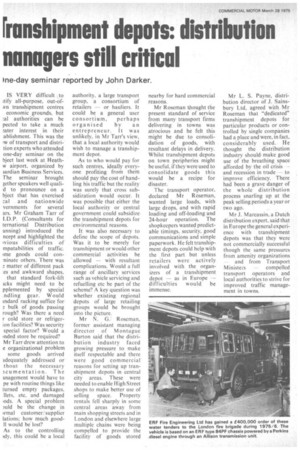fronshipment depots: distribution wagers still critical
Page 20

If you've noticed an error in this article please click here to report it so we can fix it.
Ine-day seminar reported by John Darker.
IS VERY difficult \ to :tify all-purpose, out-ofAin transhipment centres economic grounds, but ;al authorities can be pected to take a much .!.ater interest in their ablishment. This was the 1,v of transport and distrition experts who attended one-day seminar on the bject last week at Heathw airport, organized by iardian Business Services. The seminar brought ;ether speakers well quali d to pronounce on a bject that has exercised zal and nationwide vernments for several ars. Mr Graham Tarr of I.D.P. (Consultants for ternational Distribution anning) introduced the ncept and highlighted the ■ vious difficulties of rnpatabilities of traffic. ime goods could conTiinate others. There was matter of different pack es and awkward shapes, that standard fork-lift icks might need to be pplemented by special odling gear. Would tndard racking suffice for bulk of goods passing rough? Was there a need r cold store or refrigerLon facilities? Was security special factor? Would a ■ nded store be required? Mr Tarr drew attention to e organizational problem some goods arrived adequately addressed or thout the necessary )cumentation. The anagernent would have to pe with routine things like turned empty packages, llets, etc, and damaged ods. A special problem )uld be the change in Irmal customer/ supplier Lations; how much goodII would be lost?
As to the controlling rdy, this could be a local authority, a large transport group, a consortium of retailers — or hauliers. It could be a general user consortium, perhaps organised by an entrepreneur. It was unlikely, in Mr Tarr's view, that a local authority would wish to manage a transhipment depot.
As to who would pay for such centres, ideally everyone profiting from them should pay the cost of handling his traffic but the reality was surely that cross subsidization would occur. It was possible that either the local authority or central government could subsidize. the transhipment depots for environmental reasons.
It was also necessary to define the scope of depots. Was it to be merely for transhipment or would other commercial activities be allowed — with resultant complications. Would a full range of ancillary services such as vehicle servicing and refuelling etc be part of the scheme? A key question was whether existing regional depots of large retailing groups would be brought into the picture.
Mr N. G. Roseman, former assistant managing director of Montague Burton said that the distribution industry faced growing pressure to make itself respectable and there were good commercial reasons for setting up transhipment depots in central city areas. These were needed to enable High Street shops to make better use of selling space. Property rentals fell sharply in some central areas away from main shopping streets and in London and elsewhere large multiple chains were being compelled to provide the facility of goods stored nearby for hard commercial reasons.
Mr Roseman thought the present standard of service from many transport firms delivering in towns was atrocious and he felt this might be due to consolidation of goods, with resultant delays in delivery. Whilst transhipment depots on town peripheries might be useful, if they were used to consolidate goods this would be a recipe for disaster.
The transport operator, declared Mr Roseman, wanted large loads, with large drops, and with rapid loading and off-loading and 24-hour operation. The shopkeepers wanted predictable timings, security, good communications and simple paperwork. He felt transhipment depots could help with the first part but unless retailers were actively involved with the organizers of a transhipment depot -as in Europe -difficulties would be immense. Mr L. S. Payne, distribution director of 1 Sainsbury Ltd, agreed with Mr Roseman that "dedicated" transhipment depots for particular products or controlled by single companies had a place and were, in fact, considerably used. He thought the distribution industry should make good use of the breathing space afforded by the oil crisis – and recession in trade to improve efficiency. There had been a grave danger of the whole distribution process snarling up at the peak selling periods a year or two ago.
Mr J. Marcassin, a Dutch distribution expert, said that in Europe the general experience with transhipment depots was that they were not commercially successful though the same pressures from amenity organizations and from Transport Ministers – compelled transport operators and local authorities to strive for improved traffic management in towns.




























































































